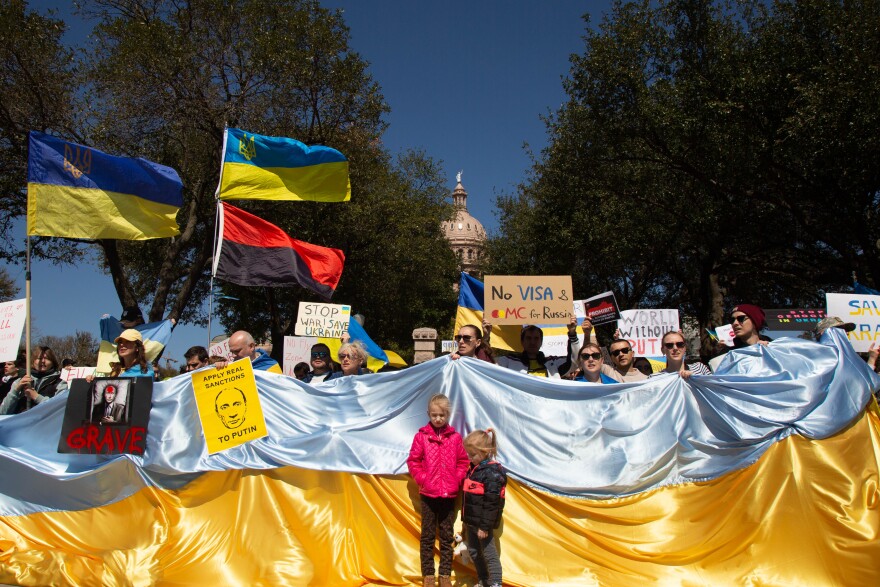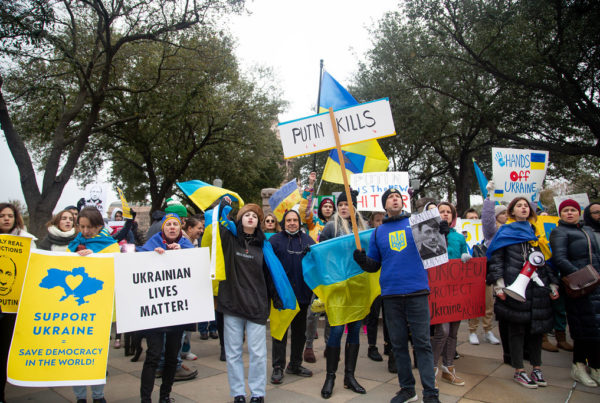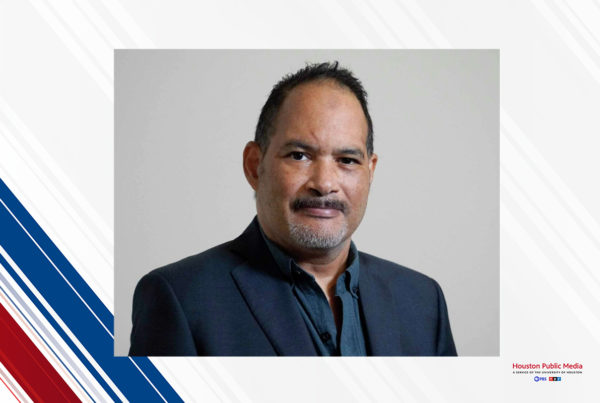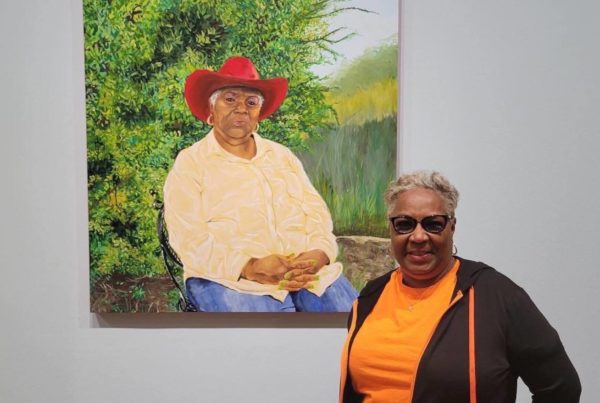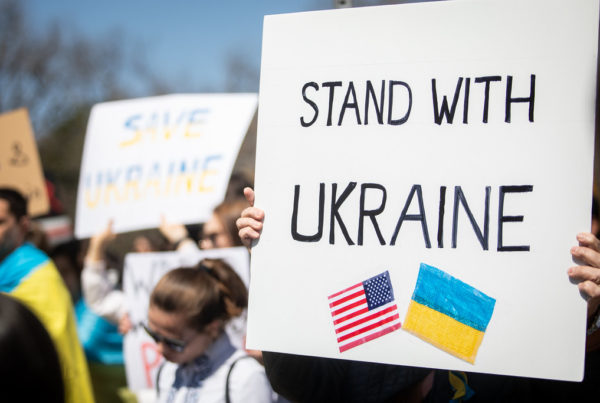From KUT:
For the past week, Anna Bereznyak has had a new morning routine: Wake up. Grab her phone. Confirm her family is still alive.
“’Are you OK? Are you still there?’” Bereznyak said, describing the messages she sends. “You are waiting impatiently for them to respond because you literally don’t know what happened while you were sleeping.”
Born and raised in Ukraine’s capital, Kyiv, Bereznyak emigrated to the U.S. two years ago. Her parents and her niece still live in the Eastern European nation. Since Russia invaded Ukraine a week ago, her mother and niece have moved to the countryside to avoid the fighting in Kyiv; her father has stayed.
Each hour she doesn’t hear from them, her worry mounts.
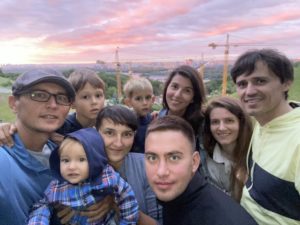
Anna Bereznyak attends a rally in support of Ukraine in front of the Visa building in Austin on Tuesday. The demonstrators called on Visa to block Russian banks from its network.
“Three hours after your last contact you are like, ‘Yeah, they are fine, they just don’t have network,’” Bereznyak, who lives with her husband and two kids in Georgetown, said. “Eight hours you’re getting anxious. By 12 hours, you start calling all the possible emergency services checking on them.”
Austin’s foreign-born Ukrainian community is small; in 2019, the U.S. Census Bureau estimated there were fewer than 1,000 living in the city. But Ukrainians in Central Texas have been organizing and attending daily protests outside of businesses and government buildings.
“We all know that when something like this happens you got to find your people,” “Three hours after your last contact you are like, ‘Yeah, they are fine, they just don’t have network,’” Bereznyak, who lives with her husband and two kids in Georgetown, said. “Eight hours you’re getting anxious. By 12 hours, you start calling all the possible emergency services checking on them.”
Austin’s foreign-born Ukrainian community is small; in 2019, the U.S. Census Bureau estimated there were fewer than 1,000 living in the city. But Ukrainians in Central Texas have been organizing and attending daily protests outside of businesses and government buildings.
“We all know that when something like this happens you got to find your people,”
KUT spoke with Ukrainians living in Austin to understand how they’re dealing with daily life as war rages thousands of miles away in their home country. Three women described an almost electric current of constant fear — an anxiety and helplessness that pulses through them.
Nataliya Kovalchuk said the past week has felt like a “bad dream.” But in order to wake up from a dream you have to sleep first; that’s something Kovalchuk is not doing.
“Sometimes it’s hard to breathe. It’s been hard to sleep at night, too,” she said. “Even physically I feel like I’m in pain. It’s hard being here and knowing so much destruction is going on. I feel helpless.”
Kovalchuk’s parents, brother and nieces were living in Ukraine when Russian troops invaded last week. Since then, her nieces have fled with their mother and one set of grandparents to Italy. But the rest of Kovalchuk’s family has stayed behind in their small hometown in western Ukraine, a region of the country not yet bombarded by Russian military attacks.
Regardless, they’ve been hunkering indoors, leaving the house only when they run out of food.
“They’ve heard the sirens alarming that there is a possibility of airstrikes. They heard military aircrafts over,” Kovalchuk said. “[On Tuesday] my mom said there was a big drone she could see from her window.”
Kovalchuk said she has the news on as often as possible, struggling to watch the decimation of her country while also feeling these are events she needs to witness. Her son, who is 6 years old, has noticed a change in her.
“He sees me crying. He sees me being not emotionally with him because I have to check messages [from family and friends] all the time,” she said. “I know that he wants to play. He wants me to be his regular mom that takes care of him, goes to the playground, has fun. But I can’t.”
On Tuesday, Russia bombed Kharkiv, a region in Eastern Ukraine where Kovalchuk’s husband, Vitaliy Myronenko, is from. He watched as Freedom Square was showered in dust and debris. As a university student, he often walked through the large public square in the center of the city.
“It’s heartbreaking,” he said, gasping as he fought back tears.
The images of destruction are hard to reconcile with Kovalchuk’s memories of her country. She said she keeps thinking back to last summer, when the family traveled to Ukraine. They spent a week in the Carpathian Mountains in the western part of the country; there, they walked the hills and collected wild berries.
“I treasure that memory so much right now,” she said.
What has helped Kovalchuk and her family is to join rallies throughout Austin in support of Ukraine. This weekend her 6-year-old son, Alexander, asked if he could join her; Kovalchuk has struggled to explain war to him, but decided he could come.
At first, he was amazed.
“’Oh my god, Mommy, there are so many Ukrainian flags here. There are so many people here,’” he told her. But his fascination, she said, quickly turned to recognition.
“He saw the same emotions amongst those people that I had. Then he realized that something bad is going on.”
As of March 1, the United Nations said it had recorded more than 200 civilians killed during the war. More than 1 million Ukrainians have fled the country.
Darya Ledesma’s family is not among them. Her mom, sister and niece are have spent the last few days cowering in a house in the countryside outside Kyiv where the violence has recently escalated.
“They could hear loud explosions, could see fire from the window,” Ledesma, who lives in Austin, said.
As of Thursday, her family was attempting to drive to Ternopil, a city in Western Ukraine. While they remain unharmed, Ledesma said, she worries about long-lasting trauma.
“My sister is scared of every noise, whether it’s a teakettle, whether something falls. She’s scared of the night. She’s scared to go to bed,” Ledesma said. “My family is scarred forever and probably for generations.”
Ledesma said she worries most about her niece, who is 7 years old. Ledesma’s sister told her recently the young girl screamed at the adults around her.
“Please, everybody be quiet!” she reportedly yelled, griped by exhaustion. “Stop talking about war.”
Ledesma, of course, doesn’t want people outside Ukraine to be quiet.
“Please join our rallies,” she said. “Collect humanitarian help. Donate. Call on your senators and congressmen. Share the truth. Speak up.”


